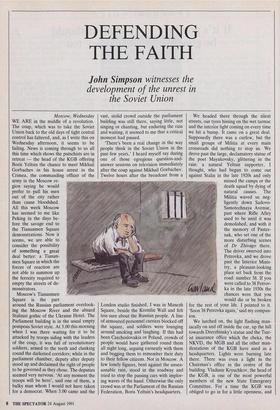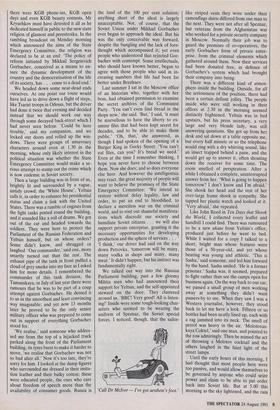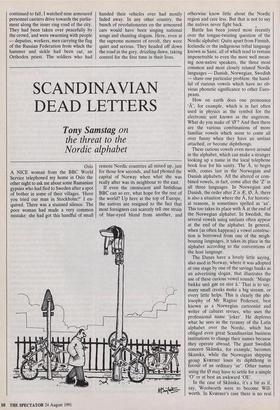DEFENDING THE FAITH
John Simpson witnesses the
development of the unrest in the Soviet Union
Moscow's Tiananmen Square is the part around the Russian parliament overlook- ing the Moscow River and the absurd Stalinist gothic of the Ukraine Hotel. The Parliament building is in the usual empty pompous Soviet style. At 3.00 this morning when I was there waiting for it to be attacked by troops siding with the leaders of the coup, it was full of revolutionary soldiers, armed to the teeth and clanking round the darkened corridors; while in the parliament chamber, deputy after deputy stood up and declaimed the right of people to be governed as they chose. The deputies seemed very nervous. 'At any moment the troops will be here', said one of them, a bulky man whom I would not have taken for a democrat. When 3.00 came and the vast, stolid crowd outside the parliament building was still there, saying little, not singing or chanting, but enduring the rain and waiting, it seemed to me that a critical moment had passed.
`There's been a real change in the way people think in the Soviet Union in the past few years,' I heard myself say during one of those egregious question-and- answer sessions on television immediately after the coup against Mikhail Gorbachev. Twelve hours after the broadcast from a London studio finished, I was in Manezh Square, beside the Kremlin Wall and felt less sure about the Russian people. A line of armoured personnel carriers blocked off the square, and soldiers were lounging around smoking and laughing. If this had been Czechoslovakia or Poland, crowds of people would have gathered round them all night long, arguing earnestly with them and begging them to remember their duty to their fellow citizens. Not in Moscow. A few lonely figures, bent against the unsea- sonable rain, stood in the roadway and tried to stop the passing cars with implor- ing waves of the hand. Otherwise the only crowd was at the Parliament of the Russian Federation, Boris Yeltsin's headquarters. We lurched on, the light flashing man- iacally on and off inside the car, up the hill towards Dzerzhinsky's statue and the Tsar- ist insurance office which the cheka, the NKVD, the MGB and all the other man- ifestations of the KGB have used as a headquarters. Lights were burning late there. There was even a light in the Chairman's office in the centre of the building. Vladimir Kryuchkov, the head of the KGB, is one of the most powerful members of the new State Emergency Committee. For a time the KGB was obliged to go in for a little openness, and there were KGB phone-ins, KGB open days and even KGB beauty contests. Mr Kryuchkov must have detested it all as he dedicated himself in public to the new state religion of glasnost and perestroika. In the rambling broadcast on Monday morning which announced the aims of the State Emergency Committee, the religion was declared to be at an end: 'The policy of reform initiated by Mikhail Sergeievich Gorbachev, conceived as a means to en- sure the dynamic development of the country and the democratisation of the life of its society, has . . come to a dead end.'
We headed down some near-dead ends ourselves. At one point our route would have led us to drive down a flight of steps, like Tsarist troops in Odessa, but the driver had done it twice that evening and decided instead that we should work our way through some decayed back-street which I had never seen before. 'Could be here trouble,' said my companion, and we locked our doors and rolled up the win- dows. There were groups of unsavoury characters around even at 1.30 in the morning, whose only likely interest in the political situation was whether the State Emergency Committee would make a se- rious attempt to stamp out the crime which is now endemic in Soviet society.
Then a large building was in front of us, brightly lit and surrounded by a vague, untidy crowd: the 'White House', Yeltsin calls it, in order to enhance his presidential status and claim a link with the United States. There was a rumble of engines from the light tanks posted round the building, and it sounded like a roll of drums. We got out of the car and headed towards the soldiers, They were here to protect the Parliament of the Russian Federation and Yeltsin himself, but on whose orders? Some didn't know, and shrugged or laughed. 'Our commander,' said one, more smartly turned out than the rest. The exhaust pipe of the tank in front puffed a cloud of grey smoke into my face as I asked him for more details. I remembered the commander of this tank division, the Tamanskaya; in July of last year there were rumours that he was to be part of a coup attempt against Gorbachev. He denied it to us in the smoothest and least convincing way imaginable; and yet now 13 months later he proved to be the only senior military officer who was prepared to come out in support of everything Gorbachev stood for.
`We realise,' said someone who addres- sed me from the top of a hijacked truck parked along the front of the Parliament building, its tyres burst to make it harder to move, `we realise that Gorbachev was not so bad after all.' Now it's too late, they're sorry for him. I looked at the damp figures who surrounded me dressed in their imita- tion leather and their bulky cotton; these were educated people, the ones who care about freedom of speech more than the availability of consumer goods. Russia is the land of the 100 per cent solution; anything short of the ideal is largely unacceptable. Not, of course, that the Soviet Union under Mikhail Gorbachev ever began to approach the ideal. But his was the only conceivable way forward, despite the bungling and the lack of fore- thought which accompanied it; yet even people who understood that rejected Gor- bachev with contempt. Some intellectuals, who should have known better, began to agree with those people who said in in- creasing numbers that life had been far better under Brezhnev.
Last summer I sat in the Moscow office of an historian who, together with her boss, had obtained permission to examine the secret archives of the Communist Party. 'You can't even find bread in the shops now,' she said. 'But,' I said, 'it must be marvellous to have the liberty to ex- amine files that had been kept secret for decades, and to be able to make them public."Oh, that,' she answered, as though I had spoken of the opening of a Burger King in Gorky Street: 'You can't eat files, can you? It's bread we need.' Even at the time I remember thinking, I hope you never have to choose between them. Now she does; and so does everyone else here. And however the intelligentsia may react, the great majority of people will want to believe the promises of the State Emergency Committee: 'We intend to restore without delay legality, law and order, to put an end to bloodshed, to declare a merciless war on the criminal world, and to rout out shameful manifesta- tions which discredit our society and humiliate Soviet citizens . . we will also support private enterprise, granting it the necessary opportunities for developing production and the sphere of services . . . ' `I think,' our driver had said on the way down Petrovka, 'tomorrow will be many, many vodka in shops and many, many meat.' It didn't happen; but his instinct was fundamentally right.
We talked our way into the Russian Parliament building, past a few gloomy Militia men who had announced their support for Yeltsin, and the self-appointed steward on the door. They clustered around us. 'BBC! Very good! All is listen- ing!' Inside were some tough-looking char- acters who seemed to be wearing the uniform of Speznaz, the Soviet special forces. I noticed, though, that the sailor- `Call Dr McIver — I've got aesthete's foot.' like striped vests they wore under their camouflage shirts differed from one man to the next. They were not after all Speznaz, but veterans from the Afghanistan war who worked for a private security company in Moscow. Normally their job was to guard the premises of co-operatives, the early Gorbachev form of private enter- prise, from the criminal elements which gathered around them. Now their services had been donated free, in defence of Gorbachev's system which had brought their company into being.
There was a different kind of atmos- phere inside the building. Outside, for all the seriousness of the position, there had been a certain defiant jollity. The people inside who were still working in their offices at 2.30 in the morning seemed distinctly frightened. Yeltsin was in bed upstairs, but his press secretary, a very large and very blonde lady, was still answering questions. She got up from her desk and sat down at a table opposite me, but every half minute or so the telephone would ring with a dry whirring sound, like an insect trapped behind a pane, and she would get up to answer it, often shouting down the receiver for some time. The room smelled of perspiration. After a while I obtained a complete, uninterrupted answer from her. 'What is going to happen tomorrow? I don't know and I'm afraid.' She shook her head and the rest of her over-large frame shook in sympathy. She tapped her plastic watch and looked at it. `Very afraid,' she repeated.
Like John Reed in Ten Days that Shook the World, I collected every leaflet and handbill I could find. There was rumoured to be a new ukase from Yeltsin's office, produced just before he went to bed. While I waited for a copy I talked to a short, bright man whose features were those of a 50-year-old, and yet whose bearing was young and athletic. 'This is Sasha,' said someone, and led him forward by the hand. Sasha smiled. 'He is a former prisoner.' Sasha was, it seemed, prepared to fight rather than see the camps open for business again. On the way back to our car, we passed a small group of men working away at something they didn't want passers-by to see. When they saw I was a Western journalist, however, they stood back to let me have a look. Fifteen or so bottles had been neatly lined up, each with a rag jammed into its neck. The smell of petrol was heavy in the air. `Molotovas- kaya Coktel,' said one man, and pointed to the row admiringly. Then he mimed the act of throwing a Molotov cocktail and the others laughed in the faint light of the street lamps.
Until the early hours of this morning, I had thought that most people here were too passive, and would allow themselves to be governed by anyone who could seize power and claim to be able to put order back into Soviet life. But at 5.00 this morning as the sky lightened, and the rain continued to fall, I watched nine armoured personnel carriers drive towards the parlia- ment along the inner ring road of the city. They had ..been taken over peacefully by the crowd, and were swarming with people — deputies, workers, men carrying the flag of the Russian Federation from which the hammer and sickle had been cut, an Orthodox priest. The soldiers who had handed their vehicles over had mostly faded away. In any other country, the bunch of revolutionaries on the armoured cars would have been singing national songs and chanting slogans. Here, even at the supreme moment of revolt, they were quiet and serious. They headed off down the road in the grey, drizzling dawn, taking control for the first time in their lives.




















































 Previous page
Previous page